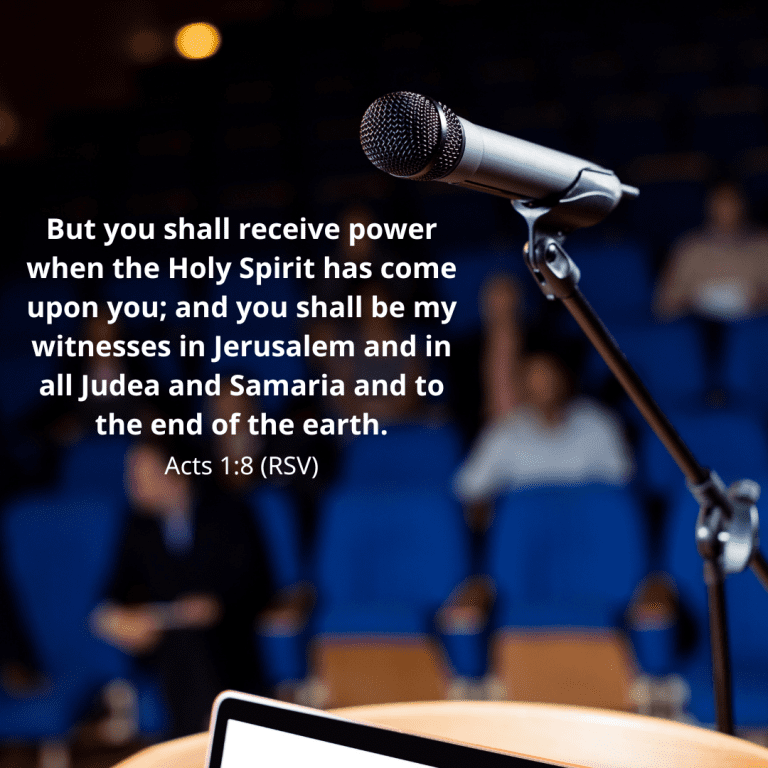
The Holy Spirit is not just an abstract concept or a mystical force; He is a personal and powerful presence in the life of every believer. Understanding His role and allowing Him to actively work in our lives is essential for spiritual growth and victorious Christian living. In this article, we will delve into the transformative influence of the Holy Spirit, supported by biblical narratives and reflections, and see how He continues to work in the lives of believers today.
1. The Holy Spirit as Our Guide
One of the most profound ways the Holy Spirit works in a believer’s life is by guiding us through the complexities of life. Jesus promised this guidance when He said:
John 16:13 (RSV) – “When the Spirit of truth comes, he will guide you into all the truth; for he will not speak on his own authority, but whatever he hears he will speak, and he will declare to you the things that are to come.”
Consider the story of Philip and the Ethiopian eunuch (Acts 8:26-40). Philip, led by the Spirit, approached the chariot and explained the Scriptures, resulting in the eunuch’s conversion and baptism. This narrative highlights how sensitive obedience to the Spirit’s guidance can lead to profound outcomes.
Today, believers can experience the Holy Spirit’s guidance in everyday decisions—whether in career choices, relationships, or ministry. Many testify of the Spirit’s prompting to reach out to someone in need or speak a word of encouragement at just the right moment.
2. The Spirit Who Empowers
The empowerment of the Holy Spirit is vividly portrayed at Pentecost. After Jesus’ ascension, the disciples were unsure and fearful. But when the Spirit descended upon them, they were transformed into bold witnesses.
Acts 1:8 (RSV) – “But you shall receive power when the Holy Spirit has come upon you; and you shall be my witnesses in Jerusalem and in all Judea and Samaria and to the end of the earth.”
Peter, who once denied Christ, boldly preached, leading to the conversion of about three thousand people (Acts 2:14-41). The Spirit’s power equips ordinary people to perform extraordinary acts of faith.
This empowerment is evident when believers boldly share their faith despite challenges or speak truth in situations where silence seems easier. The Spirit gives us courage to act according to God’s will.
3. The Spirit as Comforter
Life’s challenges can leave us weary and disheartened. The Holy Spirit, however, comes as a Comforter, assuring us of God’s presence in our pain.
John 14:16-17 (RSV) – “And I will pray the Father, and he will give you another Counselor, to be with you forever, even the Spirit of truth.”
When Paul faced persecution and hardship, he found comfort through the Spirit’s inner strengthening (2 Corinthians 1:3-5). This divine comfort enabled him to endure and continue his mission.
In modern life, believers find comfort when overwhelmed by grief, loss, or uncertainty. Through prayer and worship, the Holy Spirit brings peace that surpasses understanding, reminding us that we are never alone.
4. The Spirit of Transformation
Paul emphasizes the transformative work of the Holy Spirit in believers:
Romans 8:11 (RSV) – “If the Spirit of him who raised Jesus from the dead dwells in you, he who raised Christ Jesus from the dead will give life to your mortal bodies also through his Spirit which dwells in you.”
When the Spirit transforms a believer, old habits, sins, and weaknesses are replaced with new life, marked by the fruit of the Spirit (Galatians 5:22-23). This transformation is not instantaneous but a continual process as we yield to His work.
In today’s context, transformation might involve overcoming addiction, finding hope amidst despair, or growing in patience and love. Believers experience gradual yet profound change as they submit daily to the Spirit’s leading.
5. The Holy Spirit and Fellowship
Unity among believers is one of the key works of the Holy Spirit:
1 Corinthians 12:13 (RSV) – “For by one Spirit we were all baptized into one body—Jews or Greeks, slaves or free—and all were made to drink of one Spirit.”
The early church exemplified this unity. Despite differences in background and social status, they were of one heart and mind (Acts 4:32). The Holy Spirit cultivates a spirit of love and collaboration within the body of Christ.
In today’s diverse church communities, the Spirit continues to break down barriers of race, culture, and background, fostering unity and love among believers. Small groups, communal worship, and service projects often become places where the Spirit knits hearts together.
6. The Spirit of Intercession
One of the profound ways the Holy Spirit helps believers is through intercession. When we face situations where words fail us, the Spirit steps in, praying on our behalf.
Romans 8:26 (RSV) – “Likewise the Spirit helps us in our weakness; for we do not know how to pray as we ought, but the Spirit himself intercedes for us with sighs too deep for words.”
This powerful assurance means that even in moments of despair or confusion, when prayer seems impossible, the Holy Spirit prays for us according to the will of God. Modern believers often experience this in moments of deep worship or crisis when words are inadequate. Trusting that the Spirit intercedes brings comfort and peace.
7. The Spirit as the Giver of Spiritual Gifts
The Holy Spirit equips believers with spiritual gifts to build up the church and serve God effectively. These gifts are diverse, ranging from wisdom and knowledge to healing and prophecy.
1 Corinthians 12:4-7 (RSV) – “Now there are varieties of gifts, but the same Spirit; and there are varieties of service, but the same Lord; and there are varieties of working, but it is the same God who inspires them all in every one. To each is given the manifestation of the Spirit for the common good.”
Believers are encouraged to seek and develop their spiritual gifts, using them to serve others and glorify God. Whether in church leadership, creative ministries, or everyday acts of kindness, the Spirit empowers believers to make a difference.
Living by the Spirit
The Christian life is not merely about following rules but about being led by the Spirit. It requires daily surrender and openness to His leading. As we allow the Spirit to work within us, our lives bear witness to His power and grace. From guiding and comforting to empowering and transforming, the Holy Spirit is actively involved in every aspect of a believer’s journey.
Today, believers can cultivate sensitivity to the Spirit through prayer, meditation on Scripture, and staying connected to a faith community. As we walk in step with the Spirit, we reflect Christ’s love and power in a world in need of hope.

When you think of a successful businesswoman, what comes to mind? Maybe someone who is independent, hardworking, and respected. Now, imagine someone like that but also deeply committed to God. That’s Lydia, a business-savvy, God-fearing woman who played a major role in the early church.
Lydia wasn’t a preacher or prophetess, yet her faith, generosity, and leadership helped spread the gospel. Her story shows that you don’t have to stand on a stage to make an impact, you can serve God right where you are. Let’s dive into seven powerful lessons from her life!
1. She Made Time for God, Even with a Busy Schedule
Acts 16:13 (KJV) – “And on the sabbath we went out of the city by a riverside, where prayer was wont to be made; and we sat down, and spake unto the women which resorted thither.”
Lydia was a businesswoman who sold purple cloth, a luxury product in her time. She had money, influence, and responsibilities, yet she still made time to seek God. When Paul arrived in Philippi, she was already at a prayer gathering with other women.
In today’s world, it’s easy to say, “I’m too busy for God.” School, work, and life keep us occupied. But Lydia shows us that no matter how full our schedules get, seeking God should always be a priority.
2. She Had an Open Heart for God’s Word
Acts 16:14 (KJV) – “And a certain woman named Lydia, a seller of purple, of the city of Thyatira, which worshipped God, heard us: whose heart the Lord opened, that she attended unto the things which were spoken of Paul.”
Lydia was already a worshipper of God, but when she heard Paul preaching about Jesus, she embraced the gospel fully. She didn’t just listen, she responded.
Many people hear about Jesus but never truly respond. Lydia didn’t just agree with what Paul said—she let God change her heart. Are we open to God speaking to us, or are we too distracted to listen?
3. She Took Immediate Action in Her Faith
Acts 16:15 (KJV) – “And when she was baptized, and her household, she besought us, saying, If ye have judged me to be faithful to the Lord, come into my house, and abide there. And she constrained us.”
Lydia didn’t hesitate. As soon as she understood the truth about Jesus, she took action, she got baptized, and she made sure her whole household did too.
Sometimes, we feel God calling us to take a step, maybe to get baptized, start reading the Bible more, or make a change in our lives. But we hesitate, waiting for the “perfect moment.” Lydia teaches us that when God moves in our hearts, we need to respond quickly.
4. She Used Her Resources for God’s Kingdom
Acts 16:40 (KJV) – “And they went out of the prison, and entered into the house of Lydia: and when they had seen the brethren, they comforted them, and departed.”
Lydia was wealthy, but she didn’t keep her blessings to herself. She opened her home as a meeting place for believers, making it a safe space for the early church to grow.
Many of us want God to bless us with success, but are we willing to use our blessings for Him? Lydia’s generosity helped spread the gospel. How can you use what you have, your time, money, talents, or even your home—to serve others?
5. She Had a Generous Spirit
Proverbs 11:25 (KJV) – “The liberal soul shall be made fat: and he that watereth shall be watered also himself.”
Lydia didn’t hesitate to give, whether it was her home, resources, or hospitality. Her generosity fueled the mission of the early church, proving that faith isn’t just about what we receive but also about what we give.
In a world that tells us to chase wealth for personal gain, Lydia shows that true prosperity comes from a generous heart. Success is great, but helping others along the way is even greater.
6. She Was a Leader in the Faith
Philippians 1:3-5 (KJV) – “I thank my God upon every remembrance of you, always in every prayer of mine for you all making request with joy, for your fellowship in the gospel from the first day until now.”
The church in Philippi, which Lydia helped start, became one of the strongest early Christian communities. Paul later wrote to them, thanking them for their faith and generosity.
Lydia’s faith didn’t just affect her, it built up an entire community of believers. She reminds us that our faith isn’t just for us; it’s meant to impact those around us.
7. She Shows That Faith and Success Can Go Together
Matthew 6:33 (KJV) – “But seek ye first the kingdom of God, and his righteousness; and all these things shall be added unto you.”
Lydia was a successful businesswoman, but she put God first. She didn’t see faith and success as two separate things—she used her success to glorify God.
Many people think they have to choose between faith and success, but Lydia proves you can have both. When you put God first, everything else will fall into place.
Conclusion
Lydia was a real-life boss lady who put God first and made a lasting impact. She proves that you don’t need a pulpit to be a leader in God’s kingdom, you just need a heart that’s willing to serve.
So, how can you be like Lydia this month?

Giving is a powerful act that reflects the heart of God and His desire for us to live generously. Throughout the Bible, we find numerous teachings that emphasize the importance and impact of giving. Whether it’s through offering our time, resources, or love, the act of giving not only blesses others but also enriches our own lives. Here are seven Bible verses that highlight the power of giving and encourage us to embrace a life of generosity.
1. Acts 20:35 “In everything I did, I showed you that by this kind of hard work we must help the weak, remembering the words the Lord Jesus himself said: ‘It is more blessed to give than to receive.’”
When we give to others, especially those in need, we are not only helping them but also experiencing the joy and fulfillment that comes from generosity. It reminds us that true happiness is found in selflessness.
2. 2 Corinthians 9:6-7 “Remember this: Whoever sows sparingly will also reap sparingly, and whoever sows generously will also reap generously. Each of you should give what you have decided in your heart to give, not reluctantly or under compulsion, for God loves a cheerful giver.”
The emphasis on giving cheerfully reminds us that our attitude matters. God values a heart that gives freely and joyfully, knowing that our contributions can lead to abundant blessings.
3. Proverbs 11:25 “A generous person will prosper; whoever refreshes others will be refreshed.”
Generosity is not just about meeting the needs of others; it also brings personal renewal and prosperity. When we give, we often receive in return, not necessarily in material wealth, but in spiritual and emotional well-being. The act of giving refreshes both the giver and the recipient.
4. Luke 6:38 “Give, and it will be given to you. A good measure, pressed down, shaken together and running over, will be poured into your lap. For with the measure you use, it will be measured to you.”
Jesus emphasizes the abundance that comes from giving. The imagery of a generous measure being returned to us illustrates that our giving will not go unnoticed or unrewarded. When we give with an open heart, we can expect God’s blessings to overflow in our lives.
5. Matthew 6:3-4 “But when you give to the needy, do not let your left hand know what your right hand is doing, so that your giving may be in secret. Then your Father, who sees what is done in secret, will reward you.”
We should give quietly and humbly, without seeking recognition or praise. The focus is on the sincerity and purity of our giving. God sees our acts of kindness, even when they are done in secret, and He will reward us accordingly. It reminds us that true giving is done for the benefit of others, not for personal glory.
6. Hebrews 13:16 “And do not forget to do good and to share with others, for with such sacrifices God is pleased.”
Sharing what we have with others is a sacrifice that pleases God. This verse highlights the importance of being mindful of others’ needs and taking action to meet them. It serves as a reminder that our acts of generosity are not just good deeds; they are expressions of our faith and love for God.
7. James 1:17 “Every good and perfect gift is from above, coming down from the Father of the heavenly lights, who does not change like shifting shadows.”
All we have comes from God. Recognizing that every gift we receive is from Him encourages us to be generous in sharing those gifts with others. When we give, we are participating in God’s work, distributing His blessings to those around us.
Conclusion
The Bible teaches that giving is a powerful way to express our faith, love, and gratitude. These verses reveal that generosity not only impacts those we help but also enriches our own lives, bringing us closer to God and His purposes. Whether through our resources, time, or compassion, giving allows us to reflect God’s love in a tangible way, creating a ripple effect of blessings that extend far beyond what we can see. By embracing a spirit of generosity, we open ourselves up to experience the fullness of life that God desires for us.
Heroes’ Day is an occasion to honor and celebrate the courage, sacrifice, and impact of heroes who have shaped our lives and communities. In the Bible, we find many stories about men and women whose lives reflect profound faith and steadfastness. These biblical heroes serve as timeless examples of virtues we can aspire to in our own lives.
Abraham: The Father of Faith
Abraham, often referred to as the “father of faith,” is a towering figure in the Bible. His story is one of unwavering trust in God. When God called Abraham to leave his homeland and go to a place he would be shown, Abraham obeyed without hesitation (Genesis 12:1-4). His willingness to sacrifice his son Isaac, trusting in God’s promise, is a testament to his profound faith (Genesis 22:1-18).
Moses: The Deliverer
Moses is celebrated as the deliverer of Israel from slavery in Egypt. His life is marked by acts of extraordinary bravery and faith. Despite his initial reluctance, Moses answered God’s call to lead the Israelites out of bondage, facing Pharaoh’s wrath and the perils of the wilderness (Exodus 3-14). His leadership and unwavering reliance on God highlight the importance of faith and perseverance.
Esther: The Courageous Queen
Esther, a Jewish queen in Persia, displayed remarkable courage and wisdom. When her people faced destruction, Esther risked her life by approaching King Xerxes uninvited to plead for their salvation. Her famous declaration, “If I perish, I perish,” (Esther 4:16) shows her bravery and selflessness in the face of great danger.
David: The Shepherd King
David, the shepherd boy who became king, is renowned for his faith and courage. His defeat of the giant Goliath with a sling and a stone is a powerful example of trusting in God’s strength rather than human might (1 Samuel 17). David’s life, though marked by imperfections, is a testament to God’s grace and the power of repentance.
Daniel: The Uncompromising Prophet
Daniel’s story is one of steadfast faith in a foreign land. Despite the threat of death, he refused to give up on his faith, continuing to pray to God even when it was not allowed. His survival in the lions’ den (Daniel 6) is a powerful reminder of God’s protection over those who remain faithful to Him.
Mary: The Obedient Servant
Mary, the mother of Jesus, exemplifies obedience and humility. When the angel Gabriel announced that she would bear the Son of God, Mary’s response was one of submission to God’s will: “I am the Lord’s servant. May your word to me be fulfilled” (Luke 1:38). Her faith and willingness to accept God’s plan played a crucial role in the story of salvation.
Paul: The Zealous Apostle
Paul, once a persecutor of Christians, became one of the most zealous apostles of Christ. His missionary journeys, tireless preaching, and numerous epistles have profoundly shaped Christian theology and practice. Paul’s transformation and dedication to spreading the gospel, despite immense suffering and persecution, are inspiring examples of redemption and commitment (Acts 9, 2 Corinthians 11:23-28).
Conclusion
As we celebrate Heroes’ Day, these biblical figures remind us that true heroism is rooted in faith, obedience, and a willingness to serve God’s purpose, even at great personal cost. Their stories encourage us to cultivate these virtues in our own lives, trusting that God can use ordinary people to accomplish extraordinary things.

The Holy Spirit is a vital part of the Christian faith, yet many believers struggle to understand who He truly is and what role He plays in their lives. In this article, we will explore the identity of the Holy Spirit using seven powerful Bible verses to help deepen our understanding.
1. The Holy Spirit as Comforter and Advocate
John 14:16-17 (RSV) – “And I will pray the Father, and he will give you another Counselor, to be with you for ever, even the Spirit of truth, whom the world cannot receive, because it neither sees him nor knows him; you know him, for he dwells with you, and will be in you.”
Jesus promised His disciples that the Holy Spirit would come as an Advocate—someone who stands by us, guiding and comforting. The Holy Spirit is not just a distant force but a constant presence who supports and defends believers.
2. The Spirit of Truth
John 16:13 (RSV) – “When the Spirit of truth comes, he will guide you into all the truth; for he will not speak on his own authority, but whatever he hears he will speak, and he will declare to you the things that are to come.”
The Holy Spirit is referred to as the Spirit of Truth because He leads us into a deeper understanding of God’s Word and His will. This guiding role helps believers discern right from wrong and stay aligned with God’s purposes.
3. The Giver of Power
Acts 1:8 (RSV) – “But you shall receive power when the Holy Spirit has come upon you; and you shall be my witnesses in Jerusalem and in all Judea and Samaria and to the end of the earth.”
One of the most significant roles of the Holy Spirit is empowering believers to be witnesses for Christ. Through His power, we are not only transformed internally but also equipped to spread the message of the Gospel with boldness.
4. The Divine Teacher
John 14:26 (RSV) – “But the Counselor, the Holy Spirit, whom the Father will send in my name, he will teach you all things, and bring to your remembrance all that I have said to you.”
The Holy Spirit is our Teacher, helping us understand and remember the teachings of Jesus. This guidance is essential as we grow in faith and navigate life’s challenges.
5. The Spirit Who Gives Life
Romans 8:11 (RSV) – “If the Spirit of him who raised Jesus from the dead dwells in you, he who raised Christ Jesus from the dead will give life to your mortal bodies also through his Spirit which dwells in you.”
The same power that raised Christ from the dead lives in believers, breathing life into our mortal bodies. This resurrection power not only brings physical renewal but also spiritual vitality.
6. The Seal of Belonging
Ephesians 1:13 (RSV) – “In him you also, who have heard the word of truth, the gospel of your salvation, and have believed in him, were sealed with the promised Holy Spirit.”
The Holy Spirit marks us as belonging to God. This seal is a guarantee of our inheritance in Christ and serves as a constant reminder that we are His.
7. The Spirit Who Unites
1 Corinthians 12:13 (RSV) – “For by one Spirit we were all baptized into one body—Jews or Greeks, slaves or free—and all were made to drink of one Spirit.”
The Holy Spirit unites believers into one body, transcending racial, social, and cultural differences. Through the Spirit, we become one in Christ, fostering unity within the church.
Embracing the Holy Spirit
Understanding who the Holy Spirit is transforms how we live out our faith. He is not just a divine presence but a Comforter, Advocate, Teacher, and Source of power and unity. As we walk with Him daily, we experience His guidance and embrace the life He offers.
May we continually seek a deeper relationship with the Holy Spirit, allowing His influence to shape every aspect of our lives.

Day 1 – Jesus Finished It
“After he said this, he was taken up before their very eyes, and a cloud hid him from their sight.” — Acts 1:9 (NIV)
When Jesus ascended into heaven, it wasn’t just a dramatic exit , it was a powerful moment of completion. Everything He came to do from healing the sick to dying on the cross and rising again was now finished. The Ascension confirmed that He had completed His mission and was returning to take His place at the right hand of God.
But here’s what’s exciting: Jesus didn’t leave us to figure things out alone. His going up meant something new was coming, the Holy Spirit. So as we begin this Ascension Week, be encouraged: the One who overcame death didn’t just rise , He rules. He finished the work, and now He’s calling you into it.
What’s one thing you can surrender to Jesus today, knowing He’s already won?
Day 2 – He Went Up to Lift Us Up
“God raised him from the dead and seated him at his right hand in the heavenly realms.” — Ephesians 1:20 (NIV)
Jesus’ Ascension wasn’t just about leaving earth, it was about being lifted to a place of honor and authority. He is now seated at the right hand of the Father, ruling over everything. But here’s the wild part — Scripture says we’re raised with Him (Ephesians 2:6)! That means you’re not living a low-level life anymore.
Your identity isn’t based on your followers, your grades, or your mistakes. It’s based on who Jesus is and what He’s done. The Ascension tells us that Jesus is not only alive, He’s in charge. And that gives us boldness to walk in confidence, knowing our Savior is reigning, and our place with Him is secure.
Today, walk with your head held high — not in pride, but in purpose. Jesus went up so you could rise above.
Day 3 – The Mission is Ours Now
“You will receive power when the Holy Spirit comes on you; and you will be my witnesses.” — Acts 1:8 (NIV)
Before Jesus ascended, He left His final instructions — not a goodbye, but a game plan. His mission didn’t end when He left. It passed to us. We’re not just called to believe in Jesus; we’re called to represent Him.
But here’s the best part, we’re not doing it alone. Jesus promised power through the Holy Spirit. That means you’ve got divine help to speak life, love boldly, and live differently. Your school, your family, your online community — they’re all places where your life can point to Jesus.
Ask yourself today: Who in my world needs hope? And how can I be a witness?
Day 4 – Don’t Just Look Up
“Why do you stand here looking into the sky?” — Acts 1:11 (NIV)
Imagine standing there, watching Jesus rise into the sky. You’d probably be frozen too, eyes wide, heart racing. But then, two angels show up and say, “Why are you just standing here?”
Sometimes, we get so caught up in the spiritual moment — the worship, the high of youth camp, the powerful sermon, that we forget to live it out. The disciples had a mission. So do you. The Ascension isn’t just a wow moment; it’s a wake-up moment.
He’s coming back, but until then, we’ve got work to do. Don’t just look up, step out.
This week, choose action. Love someone. Forgive. Encourage. Start living like your faith matters — because it does.
Day 5 – He’s Praying for You
“Christ Jesus… is at the right hand of God and is also interceding for us.” — Romans 8:34 (NIV)
Jesus didn’t ascend to forget about you. He ascended to represent you. Right now, Jesus is sitting next to the Father — and guess what He’s doing? Praying for you.
He knows your struggles. He hears your silent prayers. He sees what you’re not saying out loud. And He’s talking to the Father on your behalf. You’re not alone in your battles — heaven is backing you up.
When life feels heavy, remember this: Jesus is interceding. You’re seen, known, and supported from above.
Day 6 – We’re Waiting for Power
“Stay in the city until you have been clothed with power from on high.” — Luke 24:49 (NIV)
The disciples wanted to go, but Jesus told them to wait. Why? Because what was coming next needed more than good intentions — it needed power.
Sometimes we want to rush ahead with our own plans. But Jesus teaches us that there’s strength in waiting. In that waiting, He prepares us, shapes us, and fills us. And then, when the time is right, He launches us with power we never knew we had.
If you’re in a season of pause right now, don’t panic. God is preparing to pour something out. Get ready.
Day 7 – He’s Coming Back
“This same Jesus… will come back in the same way you have seen him go into heaven.” — Acts 1:11 (NIV)
The Ascension reminds us that Jesus went up, but the story isn’t over. One day, He’s coming back — not as a suffering servant, but as a victorious King. That truth should shift the way we live today.
Knowing He’s coming again means we live with hope, not fear. We treat others with love, not hate. We don’t waste our time, we make it count. He’s coming back, and we want to be found ready.
Let this week stir your heart with hope. Jesus is not done with the world. And He’s not done with you.

Who Is the Holy Spirit? Discover Your Advocate, Teacher, and Faithful Friend in Christian Life
Understanding who the Holy Spirit is transforms how we live out our faith. He is not just a divine presence but a Comforter, Advocate, Teacher, and Source of power and unity. As we walk with Him daily, we experience His guidance and embrace the life He offers.

Understanding who the Holy Spirit is transforms how we live out our faith. He is not just a divine presence but a Comforter, Advocate, Teacher, and Source of power and unity. As we walk with Him daily, we experience His guidance and embrace the life He offers.

What is Ascension week
When Jesus ascended into heaven, it wasn’t just a dramatic exit , it was a powerful moment of completion. Everything He came to do from healing the sick to dying on the cross and rising again was now finished. The Ascension confirmed that He had completed His mission and was returning to take His place at the right hand of God.

When Jesus ascended into heaven, it wasn’t just a dramatic exit , it was a powerful moment of completion. Everything He came to do from healing the sick to dying on the cross and rising again was now finished. The Ascension confirmed that He had completed His mission and was returning to take His place at the right hand of God.
